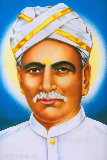Pioneer social reformer and Dalit rights activist, Ayyankali (also known as Ayyan Kali) was born in Venganoor, Thiruvananthapuram, in the princely state of Travancore. In today’s edition of This Day in History, you can read all about the life and stellar contribution of Ayyankali, social reformer, for the IAS exam.
| Visiting the UPSC Previous Year Question Papers page now is the best way to prepare for the UPSC Exam!!
The following links given below will also be of immense help in strengthening the candidates’ exam preparation: |
Biography of Ayyankali
- Ayyankali was one of the first social reformers to come from a Dalit family. He was born to parents Ayya
 n and Mala, and belonged to the Pulaya community which was considered ‘untouchable’ in Travancore/Kerala.
n and Mala, and belonged to the Pulaya community which was considered ‘untouchable’ in Travancore/Kerala. - The society in Kerala at that time was highly caste-ridden and ritualistic.
- People of the lower castes had no basic civil rights.
- Ayyankali defied such restrictions and fought for many rights such as access to public places, right to the dignity of clothing, right to use public roads, right to education, etc.
- He was also one of the earliest labour leaders from Kerala and fought for the rights of agricultural labourers long before such movements/workers’ organisations came about politically.
- He argued for the right of the farm labourer to be paid in cash rather than in kind. He also demanded rest time for the workers.
- Ayyankali’s family was engaged in agricultural work. He and other young men would often sing songs at the end of a workday to protest against society’s unjust discrimination.
- Sometimes they were physically attacked by members of the upper classes.
- But this did not deter Ayyankali from taking his work forward. He also did not create animosity among the people or against the State.
- He joined Sree Narayana Guru in urging Hindus to get rid of caste-based discrimination.
- Ayyankali challenged society by dressing like the upper castes and also driving a bullock cart on the streets.
- All these were barred for the Dalit communities and Ayyankali wanted to establish the right of all peoples to have basic rights and dignity.
- This protest soon inspired other Dalits to join and there were clashes with the upper classes that retaliated, and riots followed in Southern Kerala called the ‘Chaliyar Riots’.
- In 1900, the untouchables won the right to use most roads except those that had temples in them.
- Ayyankali also realised the importance of education as a tool for the emancipation of Dalits. He worked for the right of Dalit children to get educated in public schools. To get his demands met, he organised a strike of agricultural labourers who worked on lands owned by the upper caste men. This was probably the first ‘strike’ in the region by agricultural workers.
- Ayyankali’s demands for the strike to be called off included educational rights for Dalit children, workers be given rest time during their work, and payment for labour to be done in cash. The landlords had to concede the rights because of the stoppage of work.
- In 1907, the Travancore government ordered that all Dalit children be allowed to study in public schools.
- After protests by some government officials against that order, Ayyankali’s dream of education for all children without discrimination was realised finally in 1910.
- In 1910, Ayyankali was nominated to the Travancore Legislative Assembly, known as the Sree Moolam Popular Assembly or Praja Sabha and became its first Pulaya member.
- Ayyankali’s work was also instrumental in Pulaya women gaining the right to cover their upper bodies when in public, which was prohibited for them until about 1916.
- He founded the Sadhu Jana Paripalana Sangham which propagated education for Dalits.
- Despite his illiteracy, Ayyankali had and fought for a vision of a society where public places and dignity were not restricted to certain sections of society. He was a human rights champion even before the phrase human rights was in vogue.
- Impressed by his work, Mahatma Gandhi met Ayyankali.
- Ayyankali died in 1941 aged 78.
- He has been called “the most important Dalit leader of modern Kerala”.
Ayyankali:- Download PDF Here
To know more about the Vaikom Satyagraha, visit the linked article
Begin your IAS Exam preparation by referring to the links given in the table below:
Related Links

Comments